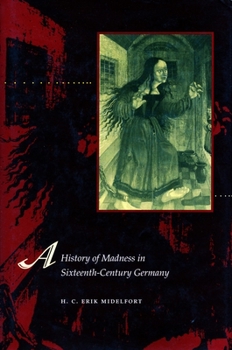A History of Madness in Sixteenth-Century Germany
Select Format
Select Condition 
Book Overview
This magisterial work explores how Renaissance Germans understood and experienced madness. It focuses on the insanity of the world in general but also on specific disorders; examines the thinking on madness of theologians, jurists, and physicians; and analyzes the vernacular ideas that propelled sufferers to seek help in pilgrimage or newly founded hospitals for the helplessly disordered. In the process, the author uses the history of madness as...
Format:Paperback
Language:English
ISBN:0804741697
ISBN13:9780804741699
Release Date:August 2000
Publisher:Stanford University Press
Length:456 Pages
Weight:0.05 lbs.
Dimensions:0.9" x 6.1" x 9.2"
Customer Reviews
0 rating





